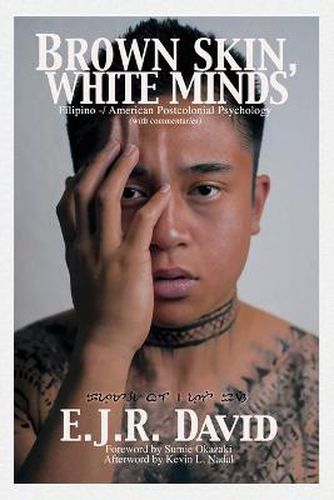Readings Newsletter
Become a Readings Member to make your shopping experience even easier.
Sign in or sign up for free!
You’re not far away from qualifying for FREE standard shipping within Australia
You’ve qualified for FREE standard shipping within Australia
The cart is loading…






This title is printed to order. This book may have been self-published. If so, we cannot guarantee the quality of the content. In the main most books will have gone through the editing process however some may not. We therefore suggest that you be aware of this before ordering this book. If in doubt check either the author or publisher’s details as we are unable to accept any returns unless they are faulty. Please contact us if you have any questions.
Filipino Americans have a long and rich history with and within the United States, and they are currently the second largest Asian group in the country. However, very little is known about how their historical and contemporary relationship with America may shape their psychological experiences. The most insidious psychological consequence of their historical and contemporary experiences is colonial mentality or internalised oppression. Some common manifestations of this phenomenon are described below:
Skin-whitening products are used often by Filipinos in the Philippines to make their skins lighter. Skin whitening clinics and businesses are popular in the Philippines as well. The
beautiful
people such as actors and other celebrities endorse these skin-whitening procedures. Children are told to stay away from the sun so they do not get
too dark.
Many Filipinos also regard anything
imported
to be more special than anything
local
or made in the Philippines. In the United States, many Filipino Americans make fun of
fresh-off-the-boats
(FOBs) or those who speak English with Filipino accents. Many Filipino Americans try to dilute their
Filipino-ness
by saying that they are mixed with some other races. Also, many Filipino Americans regard Filipinos in the Philippines, and pretty much everything about the Philippines, to be of
lower class
and those of the
third world.
The historical and contemporary reasons for why Filipino -/ Americans display these attitudes, beliefs, and behaviours - often referred to as colonial mentality - are explored in Brown Skin, White Minds. This book is a peer-reviewed publication that integrates knowledge from multiple scholarly and scientific disciplines to identify the past and current catalysts for such self-denigrating attitudes and behaviours. It takes the reader from indigenous Tao culture, Spanish and American colonialism, colonial mentality or internalized oppression along with its implications on Kapwa, identity, and mental health, to decolonization in the clinical, community, and research settings.
This book is intended for the entire community - teachers, researchers, students, and service providers interested in or who are working with Filipinos and Filipino Americans, or those who are interested in the psychological consequences of colonialism and oppression. This book may serve as a tool for remembering the past and as a tool for awakening to address the present.
$9.00 standard shipping within Australia
FREE standard shipping within Australia for orders over $100.00
Express & International shipping calculated at checkout
This title is printed to order. This book may have been self-published. If so, we cannot guarantee the quality of the content. In the main most books will have gone through the editing process however some may not. We therefore suggest that you be aware of this before ordering this book. If in doubt check either the author or publisher’s details as we are unable to accept any returns unless they are faulty. Please contact us if you have any questions.
Filipino Americans have a long and rich history with and within the United States, and they are currently the second largest Asian group in the country. However, very little is known about how their historical and contemporary relationship with America may shape their psychological experiences. The most insidious psychological consequence of their historical and contemporary experiences is colonial mentality or internalised oppression. Some common manifestations of this phenomenon are described below:
Skin-whitening products are used often by Filipinos in the Philippines to make their skins lighter. Skin whitening clinics and businesses are popular in the Philippines as well. The
beautiful
people such as actors and other celebrities endorse these skin-whitening procedures. Children are told to stay away from the sun so they do not get
too dark.
Many Filipinos also regard anything
imported
to be more special than anything
local
or made in the Philippines. In the United States, many Filipino Americans make fun of
fresh-off-the-boats
(FOBs) or those who speak English with Filipino accents. Many Filipino Americans try to dilute their
Filipino-ness
by saying that they are mixed with some other races. Also, many Filipino Americans regard Filipinos in the Philippines, and pretty much everything about the Philippines, to be of
lower class
and those of the
third world.
The historical and contemporary reasons for why Filipino -/ Americans display these attitudes, beliefs, and behaviours - often referred to as colonial mentality - are explored in Brown Skin, White Minds. This book is a peer-reviewed publication that integrates knowledge from multiple scholarly and scientific disciplines to identify the past and current catalysts for such self-denigrating attitudes and behaviours. It takes the reader from indigenous Tao culture, Spanish and American colonialism, colonial mentality or internalized oppression along with its implications on Kapwa, identity, and mental health, to decolonization in the clinical, community, and research settings.
This book is intended for the entire community - teachers, researchers, students, and service providers interested in or who are working with Filipinos and Filipino Americans, or those who are interested in the psychological consequences of colonialism and oppression. This book may serve as a tool for remembering the past and as a tool for awakening to address the present.